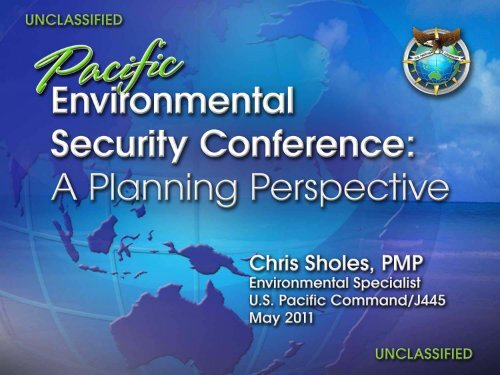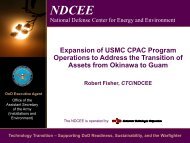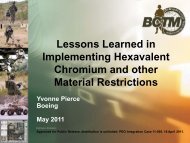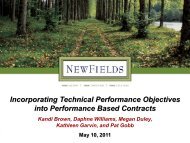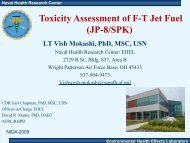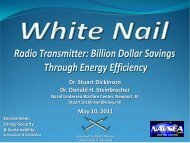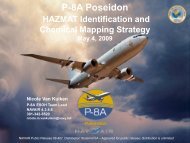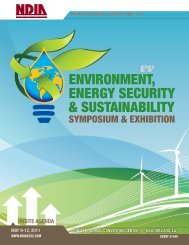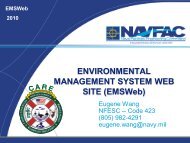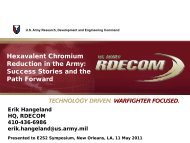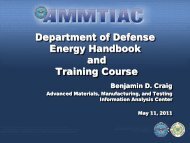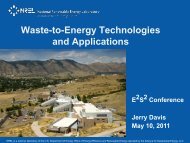sources - E2S2
sources - E2S2
sources - E2S2
You also want an ePaper? Increase the reach of your titles
YUMPU automatically turns print PDFs into web optimized ePapers that Google loves.
Brief Outline<br />
• Scope and Goals<br />
• Conference Format and Structure<br />
• Lessons Learned<br />
• Way Ahead<br />
Project management perspective on<br />
developing a COCOM environmental<br />
security program (starting with a conference)
Scope Statement<br />
Pacific Environmental Security Conference<br />
(PESC) invited military and civilian engineers<br />
and environmental experts from Pacific nations<br />
to explore the security implications of<br />
environmental change and implement solutions<br />
through military engagement.<br />
Pacific Military Engineers Environment Conf.<br />
Pacific Environmental Security Conference
Conference Goals<br />
• Engagement and dialogue amongst<br />
representatives of participant countries on<br />
environmental and security issues, with a<br />
military engineering perspective in particular<br />
• Follow-on conference in 2012 overseas, and<br />
continued engagement amongst participant<br />
countries<br />
• Support Strategic Planning and Policy (J5)<br />
engagement objectives
Long Term Way Ahead<br />
Pan-Pacific: Year 1: USPACOM Hosts<br />
Theme: Environmental Change and Security<br />
SE Asia: Year 2: PI or ASEAN hosts<br />
Theme: Environmental Change/Security<br />
Northeast Asia:<br />
Year 3: Japan Hosts<br />
Theme: Disaster Preparedness<br />
LONG-TERM ISSUES:<br />
•FUNDING<br />
•HOSTING<br />
•PACOM ROLE<br />
Australia:<br />
Year 2 or 4: Australia Hosts<br />
Theme: Sustainability<br />
South Asia: Year 5<br />
Theme: ES and Regional Stability
2011 Conference Panel Topics<br />
Panel 1 (Tuesday)<br />
Environmental Security<br />
& Sustainability<br />
Lead: J445/AWC-CSL<br />
Panel 2 (Wednesday)<br />
Water Resource<br />
Management<br />
Lead: Corps of Engineers<br />
Panel 3 (Thursday)<br />
Climate Change<br />
Adaptation<br />
Lead: OSD<br />
Panel 4 (Thursday)<br />
Disaster Preparedness<br />
Lead: J445/AWC-CSL
Academic Day, Monday, March 14<br />
• University of Hawaii-USPACOM Partnership<br />
(Begun Jan. 4, 2011)<br />
“Stay focused on the big ideas, but at the same time, let’s<br />
do what we can to pursue low hanging fruit that builds<br />
momentum,” USPACOM Bridge guidance<br />
• UH Lead was School of Ocean and Earth<br />
Science and Technology (SOEST)<br />
• Seven PhD Speakers with topics including:<br />
– Short-Term Shoreline Inundation<br />
– Arsenic Removal from Drinking Water<br />
– Economics of Sustainability Models<br />
– Regional Energy and Water Issues
Field trip: Diamond Head Crater<br />
Disaster Management Centers<br />
Hawaii National Guard<br />
Joint Operations Center<br />
Hawaii State Civil Defense<br />
Emergency Management<br />
Center<br />
Featured Speaker:<br />
MG Darryll D.M. Wong<br />
Commanding General, Hawaii National Guard;<br />
State Adjutant General; Director, State Civil Defense;<br />
Homeland Security Advisor
APRI-funded<br />
• Bangladesh (1*)<br />
• Indonesia (3*)<br />
• Philippines (3*)<br />
• Sri Lanka (2)<br />
• Thailand (3*)<br />
• Vietnam (2)<br />
• Malaysia (2)<br />
• Cambodia (2)<br />
• Laos (2)<br />
• Nepal (2*)<br />
• Maldives (2)<br />
• Mongolia (2)<br />
Participants<br />
Self-funded<br />
• Australia (5*)<br />
• China (2*)<br />
• South Korea (1*)<br />
• Singapore (2*)<br />
• Canada (1)<br />
• Japan (2*) – had to cancel<br />
due to earthquake and<br />
tsunami<br />
* Includes a speaker<br />
37 Foreign Participants Representing 17 Countries
PESC Support Team<br />
• PACOM Theater Contingency Engineering Management<br />
(Four reserve O5’s, two enlisted)<br />
– Contracting Expertise, Embassy coordination, Ground<br />
Transportation, Administration, Event Manpower<br />
• Army War College<br />
– Conference Concepts, Experience, Sustainability Panel and<br />
Environmental Security Panel Moderator, Conference Moderator<br />
• Office of Secretary of Defense (I&E)<br />
– Funding, Climate Change Panel Development & Moderator<br />
• US Army Corps of Engineers<br />
– Water Re<strong>sources</strong> Management Panel Development & Moderator<br />
• University of Hawaii – Academic Day<br />
• Hawaii National Guard – Diamond Head Field Trip Host
What We Did Well<br />
• Project Management based on PMI framework<br />
– Project Charter, WBS, Team Assignment Matrix, Change<br />
Control, Checklists…<br />
• Painted with a broad brush (four distinct panel topics)<br />
• Good mix of US and other country speakers<br />
– 12/8 – US to Foreign Speakers<br />
– 8/8 when not including Keynote and Plenary Speakers<br />
• Managing four funding <strong>sources</strong><br />
• Coordination with PACOM S&T Conference<br />
• Scope-creep management<br />
• Conference administrative mechanics seamless
What Else We Did Well<br />
• Began planning very far in advance to identify topics,<br />
attendees, speakers, venues and surprises<br />
• Conference materials - kept it simple<br />
• DVD’s at the end of conference with complete and final<br />
briefs<br />
• On-line coordination<br />
– APAN Website<br />
– Version control<br />
– Frequent interaction<br />
• Leveraged US military and civilian expertise<br />
– Contracting<br />
– Logistics<br />
– Conference Administration<br />
– and just smart
• Be resilient<br />
– Tsunami<br />
Lessons Learned<br />
• 70% Asian participants routed through Narita Airport<br />
• Operation Tomodachi, several support staff reassigned<br />
– 33⅓% scope increase with no budget or schedule<br />
change<br />
• New stakeholders (University of Hawaii and J9)<br />
• Conference tasks spilled into weekend<br />
• Conference dates confusion: March 15-17 vs. 14-17<br />
– Keynote Speaker cancellations<br />
• Mix it up more<br />
√ Seat assignment musical chairs (sessions & lunch)<br />
– After-hours interaction needed
Lessons Learned (cont’d)<br />
• Hold conference later, March was a crunch: budget<br />
cycle is unpredictable, key (& broken?)<br />
• International focus: COCOMS vs. services engineers<br />
• Early days: environmental conversation new for<br />
some countries and US embassy military desks<br />
• English-speaking emphasis<br />
– SOUTHCOM translators example<br />
• Organization Chart Melee<br />
– Military vs. Civilian in other countries<br />
– Environmental awareness generation gap<br />
• Sometimes more is better and a tough balance<br />
• Tsunami vs. Requests
Way Forward<br />
• Regional Conference<br />
– Focus on particular region or subject would allow<br />
more in depth discussion and greater idea sharing<br />
– Agenda ideas include climate change impacts and<br />
adaptation for low-lying coastal areas and islands,<br />
disaster preparedness (focusing on earthquakes<br />
and tsunamis), and environmental sustainability<br />
– Indonesia, Spring 2012 (initial discussions)<br />
• PESC 2012<br />
– Australia, Fall 2012 (initial discussions)
Long Term Way Ahead<br />
Pan-Pacific: Year 1: USPACOM Hosts<br />
Theme: Environmental Change and Security<br />
SE Asia: Year 2: ID or ASEAN hosts<br />
Theme: Environmental Change/Security<br />
Northeast Asia:<br />
Year 4: Japan Hosts<br />
Theme: Disaster Preparedness<br />
LONG-TERM ISSUES:<br />
•FUNDING<br />
•HOSTING<br />
•PACOM ROLE<br />
Australia:<br />
Year 3: Australia Hosts<br />
Theme: Sustainability<br />
South Asia: Year 5<br />
Theme: ES and Regional Stability


